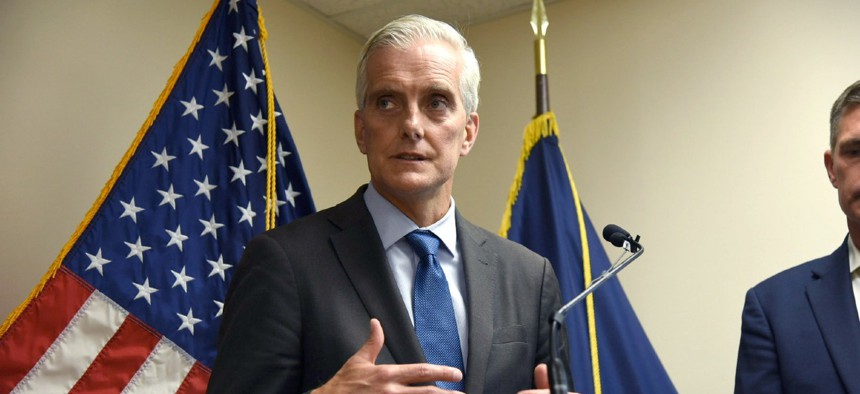
VA Secretary Denis McDonough during a tour of VA facilities in Colorado and New Mexico last month. On Wednesday the secretary conceded that the assessments the department has put forward are already dated, as they relied on information on facility usage from before the pandemic. Jennifer A. Roy/Veterans Affairs Department via Flickr
VA Vows to Modernize Its Health Care Network Even After Congress Moves to Defund Its Overhaul Plan
Secretary says the department will not start from scratch as it makes decisions on the future of its health care system, but instead will update data lawmakers criticized as flawed.
The Veterans Affairs Department is pledging to move forward with widespread updates to its network of hospitals and other facilities, even after both chambers of Congress have taken steps to spike a process aimed at doing exactly that on a comprehensive basis.
The House on Wednesday added an amendment to a VA funding bill that would defund the Asset and Infrastructure Review Commission, a panel Congress created in 2018 to identify VA health care facilities to close and areas for expansion. The measure would transfer the $5 million set aside for the commission to instead expand funding for veteran homelessness programs. The vote followed a key, bipartisan group of senators effectively killing the commission when it announced last month it would not support the slate of nominees selected to serve on the panel.
Congress created the AIR Commission in the President Trump-signed 2018 Mission Act to identify which facilities in VA’s network were underutilized and should be closed, as well as areas where the department should grow its reach. VA has worked for years to gather data and estimates on current and future usage and has released a detailed list with thousands of recommendations, but lawmakers in both parties have said the process was broken and the potential for closing VA hospitals and clinics ultimately proved too unpalatable for Congress to swallow.
Rep. Jim McGovern, D-Mass., who introduced the AIR Commission amendment, criticized VA’s recommendations from the House floor on Wednesday, saying the data had “huge and unacceptable gaps” and the process made “absolutely no sense.” The measure was approved with some Republican support in a 238-191 vote.
“This is the definition of stupid,” McGovern said. “We might as well throw taxpayer money out the window if these flawed recommendations move forward.” He added the commission represented a “backdoor way to cut services to veterans.”
Still, VA Secretary Denis McDonough told reporters on Wednesday its work would not go to waste. Instead, he said, the department would use the data to make determinations about modernizing its network. He conceded the assessments VA has put forward are already dated, as they relied on information on facility usage from before the pandemic, but said the department will continue to update the data. That work will inform VA’s Strategic Capital Investment Planning, which will help the department determine where it needs to revamp facilities or engage in major new construction.
“Doing that is important,” McDonough said. “The president will continue to ask for levels of funding necessary for us to modernize the system.”
The secretary noted a measure Congress is on the verge of passing will authorize 31 new leases for VA medical facilities, while providing $1 billion to procure them.
In its recommendations to the not-yet-formed commission earlier this year, VA proposed closing more than 30 medical centers and shuttering 172, or about 21%, of its more than 800 outpatient clinics. It suggested partly offsetting those closures by building new hospitals, increasing its medical speciality clinics by 56% and boosting reliance on private sector providers.
If it had been stood up, the commission would have reviewed that plan, conducted its own hearings and investigations, made its own proposals and sent them to the White House by early 2023. President Biden could then have rejected the plan or signed off on it and sent it to Congress. Similar to previous Base Realignment and Closure efforts at the Defense Department, Congress would have had to accept all of the recommendations or none of them. Lawmakers would have to proactively vote down the proposals to void them, however, as inaction would have allowed them to take effect.
The recommendations drew criticisms from lawmakers in both parties and a wide swath of stakeholders, who said VA was relying too heavily on the private sector, not considering the needs of veterans in remote areas and using pre-pandemic data that was no longer relevant. Secretary McDonough had said he hoped the commission would review his team’s work and make changes, and vowed to provide updated data that reflected changes to veterans’ needs in the post-COVID-19 world.
VA employees in particular voiced opposition to the recommendations, saying the plan would force them out of work and have significant consequences for their patients. VA would displace or relocate more than 50,000 jobs under its proposals, according to an estimate by the American Federation of Government Employees. The union represents most VA workers and has held rallies and lobbied against the department’s proposals since they were released. The department countered that after it built new facilities and added other services, it would come out with a net of more staff. AFGE President Everett Kelley said the House vote demonstrated lawmakers were “putting the needs of America’s veterans first.”
“As the number of veterans eligible for VA health care is expected to increase, Congress must appropriate funds to fully staff the VA, modernize existing hospitals and clinics, and build new facilities, not spend millions in taxpayer dollars to close them on the basis of faulty and outdated market assessments,” Kelley said.







